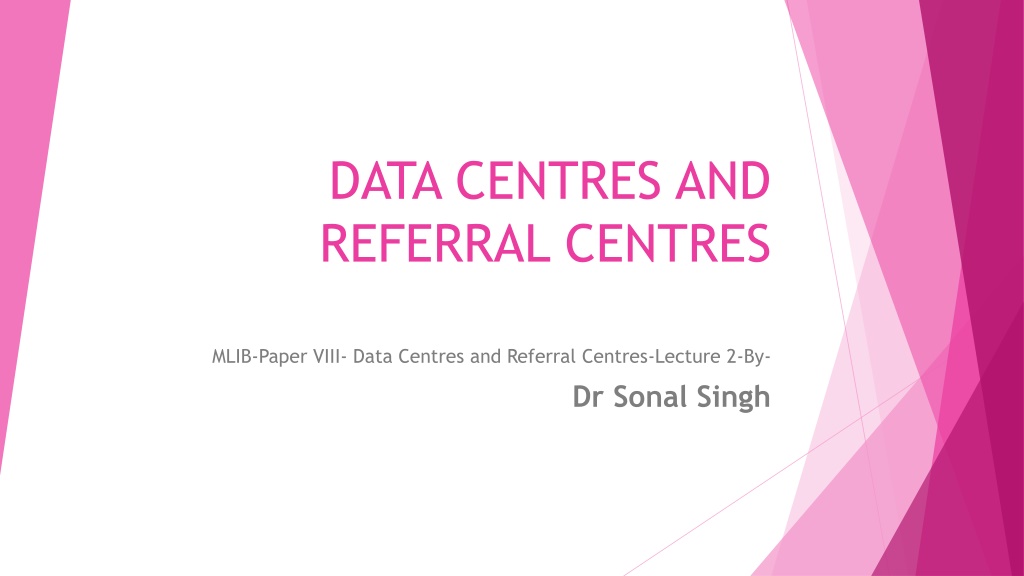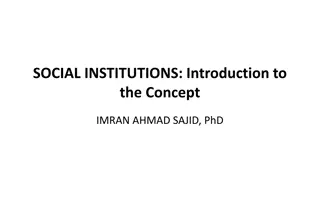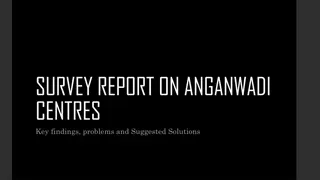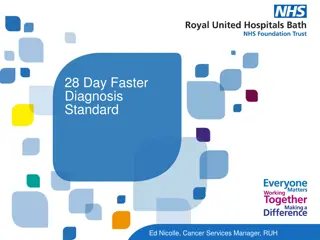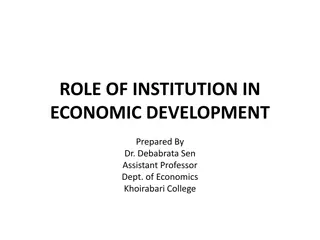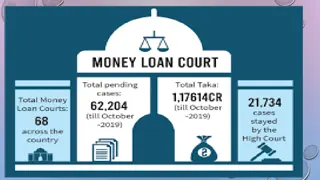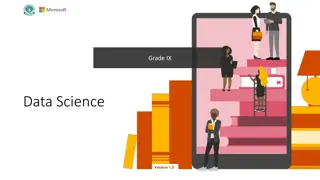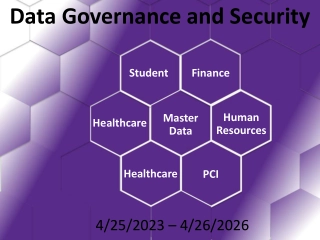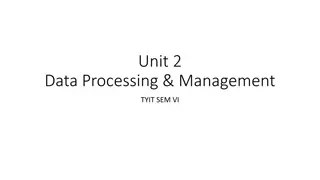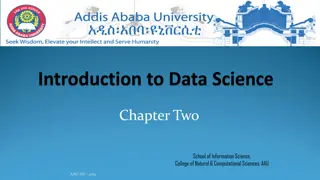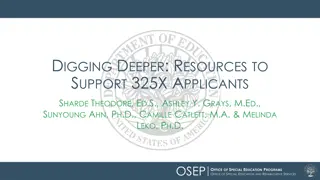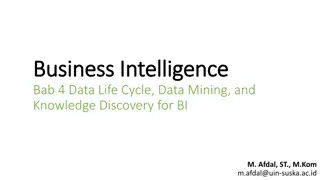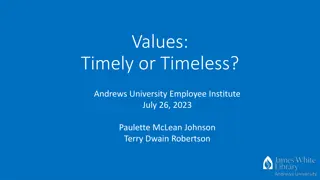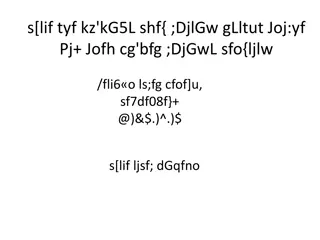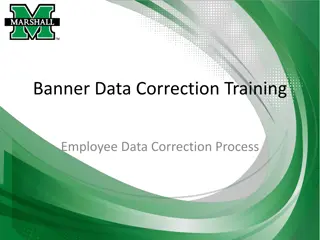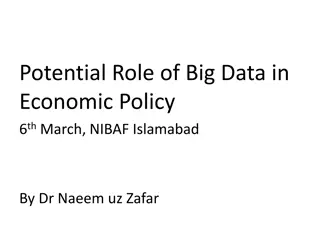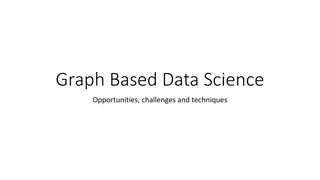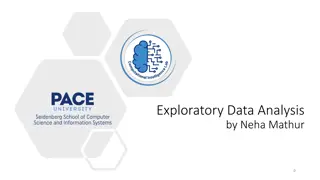Understanding Data Centres and Referral Centres in Information Institutions
Society's evolution from an agricultural to a knowledge-based society has led to the transformation of information institutions like libraries, documentation centres, and data centres. Data centres play a crucial role in gathering, processing, and disseminating data for various human progress activities. They focus on the storage and availability of organized data, essential for planning, development, and decision-making. Data, being numerical and factual information, must be collected, processed, and organized for effective utilization in research and other fields.
Download Presentation

Please find below an Image/Link to download the presentation.
The content on the website is provided AS IS for your information and personal use only. It may not be sold, licensed, or shared on other websites without obtaining consent from the author. Download presentation by click this link. If you encounter any issues during the download, it is possible that the publisher has removed the file from their server.
E N D
Presentation Transcript
DATA CENTRES AND REFERRAL CENTRES MLIB-Paper VIII- Data Centres and Referral Centres-Lecture 2-By- Dr Sonal Singh
INTRODUCTION Society has undergone changes from Agricultural to Industrial and then to knowledge society. Accordingly, information institutions are also modifying themselves to serve the changing society. Some of the popular categories of information institutions are, Libraries, Documentation Centres, Information Analysis Centres, Data Centres, Referral Centres, etc.
DATA CENTRES As the name suggests, Data Centre is a type of information institution which is concern with the collection and dissemination of data. The modern society is very much in need of data for various human progress activities like planning, development, decision making, etc. Data centres perform gathering, compilation, processing, evaluation and dissemination of data, not only in the field of Science and Technology, but also in various subject fields.
DATA CENTRES Data Centres are devoted only to the storage of data and to make it available as and when required. Data centres are one of the essential information institutions which deals with organised data compilation activities from gathering , processing, evaluation and dissemination. Data centre is an organisation which handles quantitative numerical data. It is also considered as a special information centre.
DATA Data precisely is numerical , factual , alphabetical or graphic and one dimensional. Data is unprocessed information. It is also termed as raw information. The data may be described as a discrete and unorganised piece of information. It is also defined as groups of non-random symbols, consisting of quantities, action objects, etc. Research depends on easy availability of earlier research data.
DATA Data must be collected , processed and organised for its better utilization. Data may be of different categories such as: Scientific data, Technical data, Techno-economic data, Business data, Industrial data, Manpower data, Socio-economic data, demographic date, etc. Data generally collected through observation and surveys are required to be stored for future use. The institutions developed for this purpose are known as data centre.
DATA CENTRES AND DATA BANK The terms Data centres and Data banks are used synonymously but they vary in regard to the subject they deal with and also the type of data they handle. Data centres handle only numerical data pertaining to Science and Technology primarily with physical and chemical properties. Data banks are multidisciplinary and handle all types of data comprising administrative, statistical , techno- economic, census, management subjects which are produced by various institutions and agencies.
DATA CENTRES AND DATA BANK cont . Data centres handle data themselves and also the literature concerning them whereas data banks handle only data. Data centres store data related to narrow field of specialization. Any institution interested in developing data handling capacities may be called data centre.
STRUCTURE OF DATA CENTRE The data centre generally includes three major components : 1. An organised data collection (i.e. database); 2. A connection with the data sources which periodically update the database. 3. The users who are in direct interaction with the database to meet their requirements.
FUNCTIONS OF DATA CENTRE Three main functions of data centre are- 1. Data compilation- The generated data should be compiled to put it to use . It involves collection , correction and grouping. 2. Evaluation- The data collected are evaluated by other users for its utility. 3. Dissemination- data disseminated to prevent duplication.
BASIC PRINCIPLES Of ORGANISATION OF DATA CENTRE 1. Data received and collected from different documents by a group of specialists who decide the importance and relevance of data , control and fit them with the generator source. 2.The received data are organised as basic data for their further use in initial form. 3.data converted into machine readable form and structured into a database for computer processing.
DATA CENTRE- PERSONNEL For accomplishing various functions efficiently, a data centre should be equipped with suitably trained manpower. Data centre employs following different categories of personnel- i) Data Coordinators. ii) Data Specialists. iii) Data Analysts. iv) Programmers.
DATA SERVICES OF DATA CENTRE The data centre is expected to provide two basic types of services- i- answer user queries, ii- supply the processed/synthesised data . This data is processed from basic data. The data services may be provided on demand or on anticipatory basis. The data centre collects, processes data for its dissemination to answer the user queries.
DATA CENTRES : TYPES AND LEVELS Data centres vary both in scope and size. A data centre can be established at Local, Regional, National and International level. The data services either exclusively offered by three different data centres, or collectively by one or two centres of the following types- 1. Data Evaluation Centre (DEC)- includes organisation which generate critical data systems . Its basic function is to compile, process and to evaluate data in a specialised area . These are one or two only for each country.
DATA CENTRES : TYPES AND LEVELS 2.1- Data Dissemination Centre (Local) (DDC)-These are established at the local level and cover a wide subject area. These are also a part and parcel of DECs. The user gets the data from Dec through local-DDC or sometimes directly from DECs. It offers following services- -offer references from collected published compilations. -services from stored /collected machine readable data. -assisting user in data finding . -publish secondary publications on data.
DATA CENTRES : TYPES AND LEVELS 2.2- Data Dissemination Centre (Global) (DDC)-These are established at Global level. It is highly specialised in subject matter and responds only to such information to readers. It stores all output products of Data Evaluation Centre in the respective field. It disseminates data on user s request. It provides necessary information to a Data Referral Centre (DRC).
DATA CENTRES : TYPES AND LEVELS 3. - Data Referral Centre (Global) (DDC)-There can only be a single DRC established at Global Level. This serves the users through out the world. It collects world wide information on data resources. Prepare comprehensive file with detailed subject index for data access. Refer users to appropriate sources.
CODATA- Committee on Data for Science and Technology As data can be used by different agencies in different forms, it was considered as collective effort. Many academic and research institutions, Government institutions and also international institutions started participating in this activity. In 1963, National Standard Reference Data System (NSRDS) was established in USA. Data compilation activities also started in other countries like France, Japan, Germany, UK.
CODATA- cont . Though many countries started participating in data compilation activities, yet coordination part was missing among various data compilation and data gathering activities located globally. A need of central agency was felt which can coordinate and share its activities with other countries. In 1966, International Council of Scientific Union (ICSU) created CODATA to promote and encourage compilation, evaluation and dissemination of reliable numerical data.
CODATA- cont . CODATA provides Scientists and Engineers with access to international data activities for increased awareness, direct cooperation and new knowledge. OBJECTIVES- To improve quality and accessibility of data. To improve the methods of data acquisition, management, analysis and evaluation. To facilitate international cooperation among institutions participating in collection, organisation and use. Promoting increasing awareness for participation in these activities.
CODATA- cont . PUBLICATIONS- CODATA Newsletter- announces publication of current data compilations, with comments, contents and accessibility. CODATA Bulletins. CODATA Directories of Data sources. CODATA Referral Database.
INTERNATIONAL DATA CENTRES 1. NASA Astronomical Data Centre (ADC)- publishes astronomical data and journal tables. INTERNATION CENTRE FOR DIFFRACTION DATA (ICDD)- It is a non-profit Scientific and Technical organisation. It has world wide membership from academics, Government and industries. The centre is dedicated towards collection , storage, editing, publication and dissemination of data pertaining to power diffraction for the identification of crystalline materials. It has vision to encourage the use of the Power Diffraction File (PDF) for phase identification of crystalline materials.
NATIONAL DATA CENTRES India being the World s second largest Scientific and Technological base, contributes significantly in Research and Development activities. Several institutions like, Council of Scientific and Industrial Research (CSIR), Indian Council of Medical Research (ICMR), Indian Council of Agricultural research (ICAR),Indian Space Research Organisation (ISRO), Defence Research and Development Organisation (DRDO) and many other academic and research institutions are engaged in data generation and compilation activities.
NATIONAL DATA CENTRES cont . 1. ENVIRONMENTAL INFORMATION CENTRE- It is governed by the Ministry of Environment and Forests. It provides high quality environmental data and information on India in a timely and cost-effective manner to improve environmental studies, project screening and scoping and the decision making process. 2 NATIONAL THERMOPHYSICAL PROPERTIES PROGRAM- It is located at Indian Institute of Science, Bangalore. It was established by the Science and Research Council (SERC)
NATIONAL DATA CENTRES cont . of the Department of Science and Technology (DST). The basic function of the centre is to evaluate and collect data pertaining to Thermophysical properties. 3. National Crystal Data Centre (NCDT)- National Information Centre on Crystallography (NICRYS) was established in 1982 at Department of Crystallography and Biophysics, University of Madras to serve National Information System on Crystallography under National Information Systems for Science and Technology (NISSAT) Programme of Department of Scientific and Industrial Research (DSIR), Government of India.
NATIONAL DATA CENTRES cont . 4. National Marine Data Centres (NMIDCs)- It was established by the Department of Ocean Development (DOD), Government of India with the objectives of developing efficient data handling and database structures using state-of-the art strategies to exercise stringent quality control on data.
REFERRAL CENTRES Referral Centres provide switching mechanisms among different types of institutions. It serves as intermediary directing those who have queries concerning scientific and technical subjects, to organisations as well as individuals who are specialist in concerned field and are willing to share that knowledge with others. Referral centres provide guidance and assistance in solving the information problems of the user community regarding appropriate information.
REFERRAL CENTRES- DEFINITIONS 1. Referral Centre is an organisation for directing researchers for information and data to appropriate sources such as, libraries , information centres, evaluation centres, documents and documentation centres and individuals. A referral centre does not supply data or documents. -Harrod s Librarian s Glossary It is like Information Desk which does not directly provides information but suggests sources likeky to satisfy enquirers.
REFERRAL CENTRES- NEED AND PURPOSE The basic purpose is to ease the stress on a single information system which is being loaded with all services. Libraries are integral and fundamental components of the information network system. They are unable to handle the dynamic needs of users which some times fall outside the contents of documents alone . Due to information bulk, timely importance of current information and also evaluation factor, referral centres became the utmost need to take guidance of experts.
REFERRAL CENTRES-FUNCTIONS To collect world wide information about information/data sources within the subject or mission. To prepare a comprehensive inventory of the types of information/data services available form these sources with a detailed subject index to facilitate its access. To guide users to appropriate sources where from the required data or information may be obtained. To function as an intermediary between enquirer and the organisation and/or individuals who possess specialised knowledge.
REFERRAL CENTRES- BASIC OPERATIONS A referral centre has to perform following basic operations to achieve the objectives- A referral centre should possess an inventory of all significant information resources in different disciplines. It should compile and publish directories of scientific and technical information resources. A referral centre has to analyse the operating relationship that exist in the scientific information complex.
INFORMATION RESOURCES FOR REFERRAL CENTRES- For the purpose of referral centre, information resources may be considered to include Professional Societies, University Research Bureau and institutes, Government agencies, libraries , Testing stations and individual experts as well as more professional source of information such as Technical libraries, Information and Documentation Centres and abstracting and indexing services. A referral centre might receive request by letters, by personal visits and through mobile/telephone. All the information provided is noted to maintain a record of information provided.
CLEARING HOUSES It is a central agency for collection, classification and distribution of information. It may include specialised information centres as well as conventional libraries. It represents a depository for documents with the additional objective of serving as a central agency engaged in the distribution of information. It also collects and maintains records of research and development. Sometimes subjective questions in the record are referred to source and clearing house may have to perform the function of referral centre.
THE EDUCATIONAL RESEARCH INFORMATION CENTRE (ERIC) ERIC also acts a resource centre and provides referral service. It is an online digital library of education research and information. ERIC is sponsored by the Institute of Educational Sciences of the United States Department of Education. The mission of ERIC is to provide a comprehensive, easy- to-use, searchable Internet-based bibliographic and full- text database of education research and information for educators, researchers and general public.
ACTIVITIES OF SOME NOTABLE REFERRAL CENTRES 1.National Referral Centre, Library of Congress- It was opened in 1963 as National Referral Centre for Science and Technology . This referral centre of reference department works closely with another division i.e.. Science and Technology Division of the Library of congress. It is designed as a clearing house and provides comprehensive coordinated access to the nation s resources of Science and Technical information.
NOTABLE REFERRAL CENTRES Cont It maintains an exhaustive inventory of significant information. It has developed a very comprehensive register of Information sources of different kinds. The centre maintains a file of over Twelve Thousand experts and uses it to provide information to the users. The sources contain details of names , addresses and a brief description of information source.
NOTABLE REFERRAL CENTRES Cont 2. International Referral service of UNEP- The United Nations Environmental Programme (UNEP) has established International Referral Service, for all sources of Environmental information. In every country, a national group provides details about the information through various local centres.
NOTABLE REFERRAL CENTRES Cont 3.The Science and Technology Referral Centre of Israel- It provides information relating to information services available to or from other information centres of Israel. Collects and disseminates information from sources both in Israel and abroad which are not available through commercial channels or whose acquisition requires , national, international or Governmental participation. Publishes Directories and other reference materials which are of national and interdisciplinary interest.
NOTABLE REFERRAL CENTRES Cont 4.INRES- United Nations established UNDP (United Nations Development Programme) to develop a better quality of life through development programmes. UNDP developed the Global Information Referral System (INRES) which provide comprehensive and up-to-date information or skills and capabilities available in developing countries . These skills and capabilities can be utilised for Technical Cooperation among Developing Countries (TCDC).
NOTABLE REFERRAL CENTRES Cont The INRES/TCDC has been engaged in creation of various information sources to provide referral service . It published Two directories of services of TCDC in 1977 and 1978. INRES has also built up a database of new sources of information about capabilities of different institutes from various developing countries.
REFERRAL DATABASE 1.DARE- International Social Science Directory First and the largest UNESCO Database. Contains world wide reference to research and training institutions, specialists , course projects , documentation and information services in the field of Social Sciences. 2. CODATA Referral Database (CRD) 3.EDUPLAN Educational Planning Institution 4.INISTE Institutions specialised in education, in the area of Science and Technology policies.
CONCLUSION Data Centre handles quantitative numerical data for Science and Technology . Data Banks are multidisciplinary and handle all types of data comprising administrative, statistical ,techno- economic, etc. Referral Centre is Directional Source which directs to a source of information. It provides a mechanism for switching to information sources. Referral centres collects information sources and guides users to appropriate sources.
